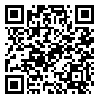Volume 14, Issue 2 (9-2022)
2022, 14(2): 102-108 |
Back to browse issues page
Download citation:
BibTeX | RIS | EndNote | Medlars | ProCite | Reference Manager | RefWorks
Send citation to:



BibTeX | RIS | EndNote | Medlars | ProCite | Reference Manager | RefWorks
Send citation to:
Yaghobi F, Charoghchian Khorasani E, Ghodsikhah F, Peyman N. The Effect of Parenting Education Based on Self-Efficacy Theory on Preventative Behaviors of Pediculosis Infection in Female Students. North Khorasan University of Medical Sciences 2022; 14 (2) :102-108
URL: http://journal.nkums.ac.ir/article-1-2622-en.html
URL: http://journal.nkums.ac.ir/article-1-2622-en.html
1- MSc Student in Health Education and Promotion, Mashhad University of Medical Sciences, Mashhad, Iran
2- Assistant Professor, Department of Health Education and Promotion, Faculty of Health, Mashhad University of Medical Sciences, Mashhad, Iran
3- MSc Student in Statistics, Social Determinants of Health Research Center, Faculty of Health, Mashhad University of Medical Sciences, Mashhad, Iran
4- Professor, Department of Health Education and Promotion, Faculty of Health, Mashhad University of Medical Sciences, Mashhad, Iran. ,peymann@mums.ac.ir
2- Assistant Professor, Department of Health Education and Promotion, Faculty of Health, Mashhad University of Medical Sciences, Mashhad, Iran
3- MSc Student in Statistics, Social Determinants of Health Research Center, Faculty of Health, Mashhad University of Medical Sciences, Mashhad, Iran
4- Professor, Department of Health Education and Promotion, Faculty of Health, Mashhad University of Medical Sciences, Mashhad, Iran. ,
Abstract: (1932 Views)
Introduction: Despite recent advances in the prevention of parasitic diseases, pediculosis is still one of the most common problems in Iran. This study was designed to determine the effect of parenting education based on self-efficacy theory on preventative behaviors of Pediculosis infection in female students in Mashhad, Iran.
Method: This quasi-experimental study was conducted on the parents of sixty first-grade girl students who entered the study through cluster random sampling. Parents were randomly divided into experimental and control groups. The instruments used in this study were the Pediculosis Infection Preventive Behaviors Questionnaire and Scherer's General Self-Efficacy Questionnaire. The educational intervention was designed based on the theory of self-efficacy and was performed in four sessions of forty-five minutes. Questionnaires were completed before the intervention, immediately after the educational intervention, and three months after the intervention. Data were analyzed using SPSS software version 24 and chi-square, independent and paired t-tests, Mann-Whitney and repeated data analysis.
Results: Before the intervention, there was no statistically significant difference between the mean score of self-efficacy and preventive behaviors of pediculosis infection (P > 0.05), but immediately after the intervention, the mean score of self-efficacy and the score of preventive behaviors showed a significant difference from before intervention (P < 0.05).
Conclusion: The results showed that the design and implementation of educational interventions based on self-efficacy theory increased students' preventive behaviors against pediculosis.
Method: This quasi-experimental study was conducted on the parents of sixty first-grade girl students who entered the study through cluster random sampling. Parents were randomly divided into experimental and control groups. The instruments used in this study were the Pediculosis Infection Preventive Behaviors Questionnaire and Scherer's General Self-Efficacy Questionnaire. The educational intervention was designed based on the theory of self-efficacy and was performed in four sessions of forty-five minutes. Questionnaires were completed before the intervention, immediately after the educational intervention, and three months after the intervention. Data were analyzed using SPSS software version 24 and chi-square, independent and paired t-tests, Mann-Whitney and repeated data analysis.
Results: Before the intervention, there was no statistically significant difference between the mean score of self-efficacy and preventive behaviors of pediculosis infection (P > 0.05), but immediately after the intervention, the mean score of self-efficacy and the score of preventive behaviors showed a significant difference from before intervention (P < 0.05).
Conclusion: The results showed that the design and implementation of educational interventions based on self-efficacy theory increased students' preventive behaviors against pediculosis.
Type of Study: Orginal Research |
Subject:
Basic Sciences
Received: 2022/03/10 | Accepted: 2022/05/24 | Published: 2022/09/11
Received: 2022/03/10 | Accepted: 2022/05/24 | Published: 2022/09/11
Send email to the article author
| Rights and permissions | |
 |
This work is licensed under a Creative Commons Attribution-NonCommercial 4.0 International License. |







